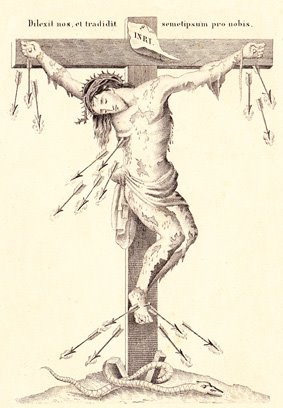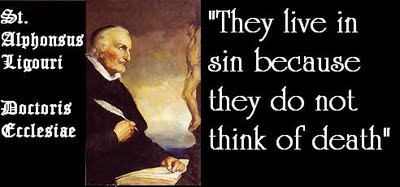"And they shall see the Son of Man coming in the clouds of Heaven with much power and majesty." Matt. xxiv. 30.
At present God is not known, and, therefore, he is as much despised by sinners, as if he could not avenge, whenever he pleases, the injuries offered to him. The wicked”looketh upon the Almighty as if he could do nothing” (Job xxii. 17,) But the Lord has fixed a day, called in the Scriptures "the day of the Lord," on which the Eternal Judge will make known his power and majesty. "The Lord," says the Psalmist, "shall be known when he executeth judgment." (Ps. ix. 17.) On this text St. Bernard writes: ”The Lord, who is now unknown while he seeks mercy, shall be known when he executes justice." (Lib. de xii. Rad.) The prophet Sophonias calls the day of the Lord”a day of wrath a day of tribulation and distress a day of calamity and misery." (i. 15.)
Let us now consider, in the first point, the different appearance of the just and the unjust; in the second, the scrutiny of consciences; and in the third, the sentence pronounced on the elect and on the reprobate.
First Point. On the different appearance of the just and of sinners in the valley of Josaphat.
1. This day shall commence with fire from Heaven, which will burn the earth, all men then living, and all things upon the earth. ”And the earth and the works which are in it shall be burnt up." (2 Pet. iii. 10.) All shall become one heap of ashes.
2 After the death of all men, “the trumpet shall sound, and the dead shall rise again." (1 Cor. xv. 52.) St Jerome used to say: “As often as I consider the day of judgment, I tremble. Whether I eat or drink, or whatever else I do, that terrible trumpet appears to sound in my ears, arise ye dead, and come to judgment" (in Matt, c. v.); and St. Augustine declared, that nothing banished from him earthly thoughts so effectually as the fear of judgment.
3 At the sound of that trumpet the souls of the blessed shall descend from Heaven to be united to the bodies with which they served God on Earth; and the unhappy souls of the damned shall come up from Hell to take possession again of those bodies with which they have offended God. Oh! how different the appearance of the former, compared with that of the latter! The damned shall appear deformed and black, like so many firebrands of Hell; but the just shall shine as the sun (Matt xiii 43) Oh! how great shall then be the happiness of those who have fortified their bodies by works of penance! We may estimate their felicity from the words addressed by St. Peter of Alcantara, after death, to St. Teresa: “O happy penance! which merited for me such glory”
4. After the resurrection, they shall be summoned by the angels to appear in the valley of Josaphat. “Nations, nations, in the valley for destruction for the day of the Lord is near‟‟ (Joel iii 14)” Then the angels shall come and separate the reprobate from the elect, placing the latter on the right, and the former on the left. ”The angels shall go out, and shall separate the wicked from the Just. ”(Matt. xiii 49). Oh! How great will then be the confusion which the unhappy damned shall suffer!. “What think you, ” says the author of the Imperfect Work, “must be the confusion of the impious, when, being separated from the just, they shall be abandoned”(Hom liv.). “This punishment alone” says St. Chrysostom, “would be sufficient to constitute a hell for the wicked”. ”Et si nihil ulterius paterentur, ista sola verecundia sufficerit eis ad poenam," (in Matt, c. xxiv.) The brother shall he separated from the brother, the husband from his wife, the son from the father, etc.
5. But, behold! the heavens are opened the angels come to assist at the general judgment, carrying, as St. Thomas says, the sign of the cross and of the other instruments of the passion of the Redeemer. ”Veniente Domino ad judicium signum crucis, et alia passionis indicia demonstrabunt." (Opusc. ii. 244.) The same may be inferred from the twenty-fourth chapter of St. Matthew: ”And then shall appear the sign of the Son of Man in Heaven; and then shall all the tribes of the earth mourn." (xxiv. 30.) Sinners shall weep at the sign of the cross; for, as St. Chrysostom says, the nails will complain of them the wounds and the cross of Jesus Christ will speak against them. ”Clavi de te conquerentur, cicatrices contra et loquentur, crux Christi contra te perorabit." (Hom, xx., in Matt.)
6. Most holy Mary, the queen of saints and angels, shall come to assist at the last judgment; and lastly, the Eternal Judge shall appear in the clouds, full of splendour and majesty. “And they shall see the Son of Man coming in the clouds of Heaven with much power and majesty." (Matt. xxiv. 30.) Oh! how great shall be the agony of the reprobate at the sight of the Judge! "At their presence” says the Prophet Joel, "the people shall be in grievous pains." (Joel ii. 6.) According to St. Jerome, the presence of Jesus Christ will give the reprobate more pain than Hell itself. “It would," he says, ”be easier for the damned to bear the torments of Hell than the presence of the Lord." Hence, on that day, the wicked shall, according to St. John, call on the mountains to fall on them and to hide them from the sight of the judge. "And they shall say to the mountains and the rocks: Fall upon us, and hide us from the face of Him that sitteth on the throne, and from the wrath of the Lamb." (Apoc. vi. 16.)
Second Point. The scrutiny of conscience.
7. "The judgment sat, and the books were opened. ”(Dan. vii. 10.) The books of conscience are opened, and the judgment commences. The Apostle says, that the Lord”will bring to light the hidden things of darkness." (1 Cor. iv. 5.) And, by the mouth of his prophet, Jesus Christ has said: ”I will search Jerusalem with lamps." (Soph. i. 12.) The light of the lamp reveals all that is hidden.
8. ”A judgment," says St. Chrysostom, ”terrible to sinners, but desirable and sweet to the just." (Hom. iii. de Dav.) The last judgment shall fill sinners with terror, but will be a source of joy and sweetness to the elect; for God will then give praise to each one according to his works. (1 Cor. iv. 5.) The Apostle tells us that on that day the just will be raised above the clouds to be united to the angels, and to increase the number of those who pay homage to the Lord. ”We shall be taken up together with them in the clouds to meet Christ, into the air." (I Thess. iv. 16.)
9. Worldlings now regard as fools the saints who led mortified and humble lives; but then they shall confess their own folly, and say: "We fools esteemed their life madness, and their end without honour. Behold how they are numbered among the children of God, and their lot is among the saints." (Wis. v. 4, 5.) In this world, the rich and the noble are called happy; but true happiness consists in a life of sanctity. Rejoice, ye souls who live in tribulation;”our sorrow shall be turned into joy." (John xvi. 20.) In the valley of Josaphat you shall be seated on thrones of glory.
10. But the reprobate, like goats destined for the slaughter, shall be placed on the left, to await their last condemnation. ”Judicii tempus," says St. Chrysostom, ”misericordiam non recipit." On the day of judgment there is no hope of mercy for poor sinners. “Magna," says St. Augustine, "jam est poena peccati, metum et memoriam divini perdidisse judicii." (Serm. xx. de Temp.) The greatest punishment of sin in those who live in enmity with God, is to lose the fear and remembrance of the divine judgment. Continue, continue, says the Apostle, to live obstinately in sin; but in proportion to your obstinacy, you shall have accumulated for the day of judgment a treasure of the wrath of God “But according to thy hardness and impenitent heart , thou treasurest up to thyself wrath against the day of wrath” (Rom ii. 5)
11. Then sinners will not be able to hide themselves but, with insufferable pain, they shall be compelled to appear in judgment. "To lie hid” says St. Anselm, “will be impossible to appear will be intolerable." The devils will perform their office of accusers, and as St. Augustine says, will say to the Judge: “Most just God, declare him to be mine, who was unwilling to be yours. ” The witnesses against the wicked shall be first, their own conscience. "Their conscience bearing witness to them, ”(Rom. ii. 15); secondly, the very walls of the house in which they sinned shall cry out against them”The stone shall cry out of the wall," (Hab. ii 11); thirdly, the Judge himself will say "I am the judge and the witness, saith the Lord." (Jer. xxix 23 ) Hence, according to St. Augustine, "He who is now the witness of .your life, shall be the judge of your cause. ” (Lib. x. de Chord., c. ii.) To Christians particularly he will say: "Woe to thee, Corozain, woe to thee, Bethsaida; for if in Tyre and Sidon had been wrought the miracles that have been wrought in you, they had long ago done penance in sackcloth and ashes”(Matt. xi. 21.) Christians, he will say, if the graces which I have bestowed on you had been given to the Turks or to the Pagans, they would have done penance for their sins; but you have ceased to sin only with your death. He shall then manifest to all men their most hidden crimes. "I will discover thy shame to thy face. ” (Nahum iii. 5.) He will expose to view all their secret impurities, injustices, and cruelties. ”I will set all thy abominations against thee”(Ezech. vii. 3.) Each of the damned shall carry his sins written on his forehead.
12. What excuses can save the wicked on that day? Ah! they can offer no excuses. ”All iniquity shall stop her mouth." (Ps. cvi. 42.) Their very sins shall close the mouth of the reprobate, so that they will not have courage to excuse themselves. They shall pronounce their own condemnation.
Third Point. Sentence of the elect, and of the reprobate.
13. St. Bernard says, that the sentence of the elect, and their destiny to eternal glory, shall be first declared, that the pains of the reprobate may be increased by the sight of what they lost. ”Prius pronunciabitur sententia electis ut acrius (reprobi) doleant videntes quid amiserunt." (Ser. viii., in Ps. xc.) Jesus Christ, then, shall first turn to the elect, and with a serene countenance shall say: "Come, ye blessed of my Father, possess the kingdom prepared for you from the foundation of the world. ”(Matt. xxv. 34.) He will then bless all the tears shed through sorrow for their sins, and all their good works, their prayers, mortifications, and communions; above all, he will bless for them the pains of his passion and the blood shed for their salvation. And, after these benedictions, the elect, singing alleluias, shall enter Paradise to praise and love God eternity.
14. The Judge shall then turn to the reprobate, and shall pronounce the sentence of their condemnation in these words . ”Depart from me, you cursed, into everlasting fire." (Matt. xxv. 41 ) They shall then be forever accursed, separated from God, and sent to burn for ever in the fire of hell. “And these shall go into everlasting punishment: but the just into life everlasting. ” (Matt. xxv. 46.)
15. After this sentence, the wicked shall, according to St. Ephrem, be compelled to take leave for ever of their relatives, of Paradise, of the saints, and of Mary the divine Mother. "Farewell, ye just! Farewell, O cross I Farewell, Paradise! Farewell, fathers and brothers: we shall never see you again! Farewell, O Mary, mother of God!”(St. Eph. de variis serm. inf.) Then a great pit shall open in the middle of the valley: the unhappy damned shall be cast into it, and shall see those doors shut which shall never again be opened. O accursed sin! to what a miserable end will you one day conduct so many souls redeemed by the blood of Jesus Christ. O unhappy souls! for whom is prepared such a melancholy end. But, brethren, have confidence. Jesus Christ is now a Father, and not judge. He is ready to pardon all who repent. Let us then instantly ask pardon from him.























No comments:
Post a Comment